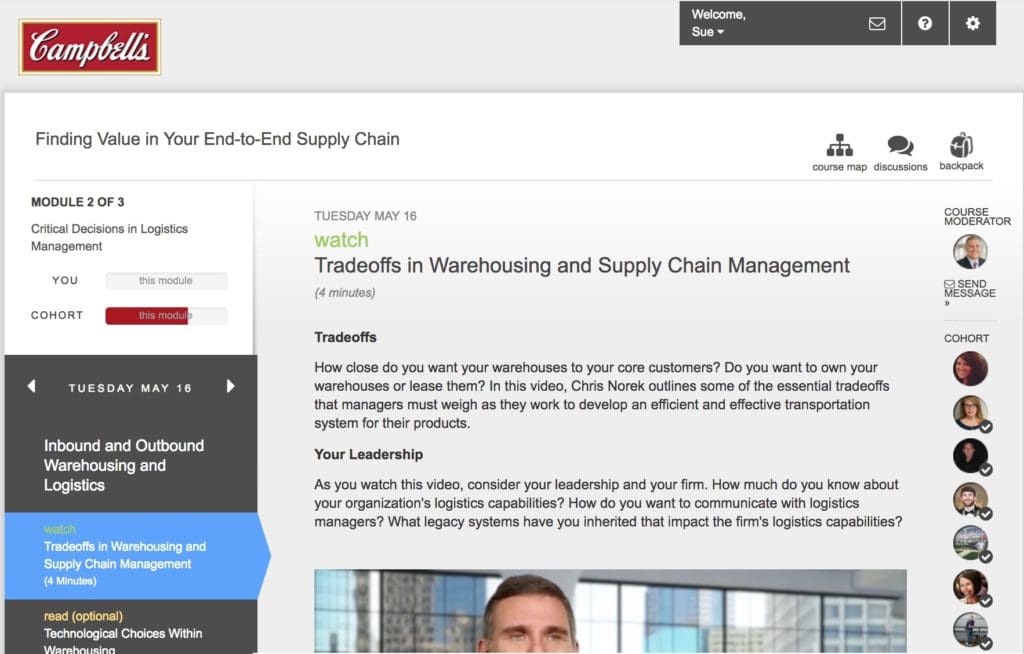Many companies send their employees to leading supply chain conferences. Yet outside the Logistics Service Provider industry, widespread internal training within a supply chain organization remains rare. But that is what Campbell Soup has done, they have put in place an innovative supply chain training program.
The Campbell Soup Company is a global food company with a range of products, including soups, simple meals, snacks and healthy beverages. With annual sales of more than $8 billion, their products are almost ubiquitous in the U.S. market. Their website claims that 95.8 percent of U.S. households have one of their products in the home.
Daniela Vonghia, VP Supply Chain Business Solutions at Campbell Soup, explained the rationale for the program. “About a year or year and a half ago we decided to try something different. We decided to bring learning to our staff to facilitate continuous improvement. In particular, “the program was about fostering collaboration.” It was not just about how one function can do its job better, but how an individual in a functional area can think and act different based on a better understanding of the upstream and downstream implications of their choices on other functional areas.
Innovative Supply Chain Training
The content was developed by professors at Pennsylvania State University; John Langley, Chris Norek, Christopher Craighead, and Steve Tracey all participated. The content was focused on the end-to-end supply chain. The weekly themes included: Challenges and Opportunities Within End-to-End Supply Chain, Procurement and Performance, Competitive Implications of Supply and Demand Planning, Manufacturing and Quality as Strategic Variables, and Critical Decisions in Logistics Management.
The content was supplemented by internal subject matter experts that can talk about how a functional area within Campbell Soup approaches these issues and the issues they experience. “This,” Ms. Vonghia says, “helps to apply the learning.”

Because the training was across the organization, at many sites and factories, they relied on an online platform from CorpU to enable distance training. The portal allowed employees to do online training whenever they had time for it. This flexibility supported the ability for employees to get their day-to-day work done, but then to enhance their knowledge in down times.
The training is designed to be engaging on an ongoing basis throughout the six-week program. There are no tests, but there are touchpoints every day during the work week. One day participants might be asked to watch a video, the next to read an article. Online conversations on the content is encouraged. Those in the program are prompted to make online comments. Cohorts from a different functional area are asked to respond from their experience. The internal subject matter expert designated for that week stays involved in conversations throughout the week. The experts that can ask provocative questions that engage the participants are particularly prized. “We look at these conversations to see if they (the participants) are connecting the dots,” Ms. Vonghia added.
On Thursday smaller groups gather for a half hour conversation and discussion surrounding a case study that reflects that week’s content. On Friday they have a live event moderated by a PSU professor “to close it out.” At the end of the program there is an idea tournament.
Collaboration is Imperative
Collaboration is imperative Ms. Vonghia explained. “Many people have very specific knowledge. But that can lock you into narrow thinking. We want a diverse perspective. To solve a problem, we need to engage people from different functions.” When you come at a problem from your own functional silo, you often have no idea of the impacts of your decision on other functional areas.
Cross functional collaboration is fostered by the group work and platform conversations. Ms. Vonghia hopes that an employee might say to another, “’Next time I address this problem, I want to connect with you and pick your brain first. We need to find a different way to work together.’” This is where group work is critical, want to create cross functional relationships.
The CorpU platform allows for engagement analytics. Engagement is measured by the comments and conversations the participants engaged in. Campbell Soup can see the level of engagement, by function, by facility, and age. “If we see people from a location not engaging, we can dig into that” Ms. Vonghia explained.
“We can also see some leadership emerge.” The ability for a participant to spark numerous other comments from other participants is one indication that a potential leader is emerging. And there is a record kept of these conversations. Campbell Soup also has the ability to go back and look at the depth of thinking illustrated in these conversations when they go to make promotion decisions.
Ms. Vonghia concluded by saying that an effort to measure total ROI is still ongoing. But this program is seen as being key to enhancing leadership in the organization and for encouraging the right behaviors to emerge. Campbell’s Soup remains bullish on the program. They are getting positive feedback from participants and have noted improved employee behaviors across many regions and generations. And last month they kicked off their fourth wave by sending a new group of supply chain employees through the program. Finally, “we’ve first focused on driving end-to-end supply chain knowledge within the supply chain function. But are currently evaluating how best to extend the learning platform to non-supply chain participants who work closely with – or whose decisions impact – the Supply Chain.”

















